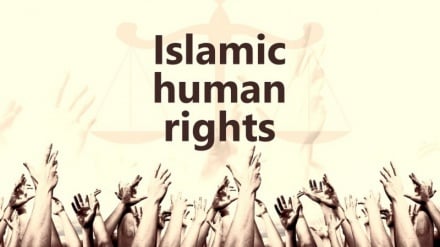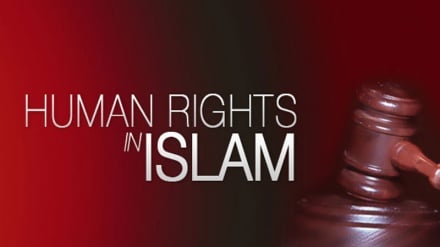Islamic human rights (9)
In the last episode, it was said that in the view of Islam, all humans are born equal. Thus, in Islamic viewpoint, human rights are rooted in the nature and innate talents of mankind.
The divine religion of Islam conveys messages and plans for all of the members of the global community. In the contemporary era, in which numerous years have passed since the divine revelations, theologians and Islamic thinkers can interpret Islamic principles and rules and regulations via reference to Hoy Quran and the tradition of Prophet of Islam, Mohammad (Blessings of God upon him and his progeny), and Infallible Imams (Peace be upon them).
The most important objection to Western human rights, Universal Declaration of Human Rights, and other international documents, is that within these documents, human rights are rooted in Western culture. This is while the most important factor in attainment of a precise understanding of the rights of individuals is achievement of a correct perception of mankind and presentation of a correct definition of him. Human rights maintain an inseparable bond with the foundations of perception of mankind and his global status. Hence, in order to prepare a charter of rights, it is necessary to study the philosophy behind those rights. However, the Western outlook is vastly different to divine and Islamic standpoint.
The Western ideology only recognizes materialism. In this ideology, mankind is a phenomenon, not an identity. This means that mankind is presented as a materialistic phenomenon, alongside other materialistic phenomena, without the consideration of the metaphysical identity of mankind, which is rooted in his divine creation.
The Western viewpoint considers a materialistic basis for the universe. In such a standpoint, any topic which goes beyond materialism is a myth and superstition.
However, in Islamic viewpoint, there are several means for perception of the universe, which are not limited to senses and experience. These means, in this view, start with senses and experience, and reach elevated phases such as mystic discoveries; and the divine revelations to the Prophet and Infallible Imams.
In Islamic standpoint, mankind is a metaphysical creature. Thereby, human rights should consider the physical and spiritual needs of mankind, both. Mankind is blend of physical and spiritual aspects and the true identity of mankind maintains three animalistic, human, and divine dimensions. Therefore, human rights should match these three aspects of mankind.
In Islamic outlook, God is the creator of the universe and mankind, and is aware of the status and interests of man. Hence, God has presented a set of plans for fulfillment of the rights and interests of mankind within the framework of religion, so that man would gain access to his rights.
In Western outlook, human rights start and end with man. In this view, there is no source other than human wisdom for setting human rights. In other words, the rights of man are secular rights in this standpoint, which have nothing to do with God, divine revelations, or religion. However, in Islamic viewpoint, man is a creature which is dependent on God. Given that man has been created by God Almighty, he cannot neglect his creator. Secondly, man is under the authority of God.
The demands and whims of mankind form the basis of Humanistic ideology. In this standpoint, humans are considered as the pivot of all values. On this basis, rights and rules and regulations are set by man, and at this phase, the Humanistic viewpoint is guided toward liberalism. Based on liberalism, the main principle in rights is the absolute freedom of mankind. But, if any individual would do as he wishes, chaos will prevail and social order will be disrupted. Hence, liberalism has been forced to set a few ostensible restrictions on freedom of individuals.
By putting emphasis on the demands and whims of mankind, instead of his interests, the ugliest misdeeds are considered sacred and tenable and are deemed as the unquestionable and natural rights of mankind, in Western outlook. For instance, in the view of Western human rights, homosexuality is deemed sacred and tenable. However, abidance by Hijab is labeled as a crime by the Western outlook. Thus, the Western thinkers name prohibition of abortion, and restriction of sexual relations as examples of injustices imposed on women.
One of the major criticisms leveled against Western human rights is their unilateral view toward mankind as a liberal creature, and presentation of a definition on freedom in accordance to liberalism.
Western human rights present a liberal and materialistic interpretation, leading to their unilateral identity. The existence of the Western mankind is solely within the framework of material life, and there is no mention of Hereafter. Hence, the material world form the basis of values set by the Western outlook.
However, in the monotheistic stand, human existence is not limited to the material world. In Islamic standpoint, rights are not restricted to worldly life, and take into consideration the material world and Hereafter, both.
It can be said that Western human rights are the product of the necessities in Europe and the West in the post-World War I and post-World War II eras. As a result, Western human rights have gone to extremes and have been void of comprehensiveness and truthfulness. Hence, Western human rights cannot be globalized.
MR/MG


